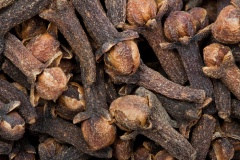Cloves
| Infobox on Cloves | |
|---|---|
| Example of Cloves |  |
| Facts | |
| Origin |
|
| Stowage factor (in m3/t) | 3,0/3,4 m3/t (chests, bales/bags) |
| Humidity / moisture |
|
| Ventilation | See text |
| Risk factors | See text |
Cloves
Description
Cloves are the aromatic dried flower buds of a tree in the family Myrtaceae, Syzygium aromaticum. The clove comprises a head formed of the four petals, which enclose the style and stamens, and the four-sided calyx, which forms a unit with the calyx tube.
Cloves are harvested primarily in Indonesia, India, Madagascar, Zanzibar, Pakistan, and Sri Lanka. They have a numbing effect on mouth tissues.
The clove tree is an evergreen that grows to a height ranging from 8–12 m, having large leaves and sanguine flowers in numerous groups of terminal clusters. The flower buds are at first of a pale colour and gradually become green, after which they develop into a bright red, when they are ready for collecting. Cloves are harvested when 1.5–2 cm long, and consist of a long calyx, terminating in four spreading sepals, and four unopened petals which form a small ball in the centre. Dried cloves are brown, hard, and nail-like in shape.
Cloves are highly aromatic and are particularly liable to damage by moisture. Stow in a dry well ventilated space, away from tea and all goods liable to be damaged by the odours of cloves — also well removed from moist or wet goods.
Oil content:
15.0 - 20.0% Essential Oils, in particular eugenol.
7.0 - 10.0% fatty oils.
Application
Used in the food, cosmetics and pharmaceutical industries.
Shipment / Storage
Cloves are highly aromatic and should be stowed away from all goods liable to take taint. Must be well ventilated, particularly if exceeding an adequate moisture level.
The product is subject to loss of weight due to drying out.
Cloves are vulnerable to moisture. When wet, cloves will turn greyish in colour and go sticky and soft. In this condition cloves cannot be reconditioned or ground, and are worthless. For this reason, it is absolutely essential to avoid rel. humidities of > 75%.
Favourable travel temperature range: 5 - 25°C.
Cloves may be kept for approx. 24 months under adequate storage conditions.
Good quality cloves are rich in oil, whole (unbroken) without stalks, having a reddish-brown colour with a closed brown head.
The product may be carried in open-sided containers, with floor dunnage or pallets laid to permit cross-ventilation. Tilts rolled up when weather permits, and stowed on board below decks in spaces where ventilation may be effected.
Risk factors
- Moisture damage
- Odour
- Contamination
- Mechanical damage
- Shrinkage
- Infestation











